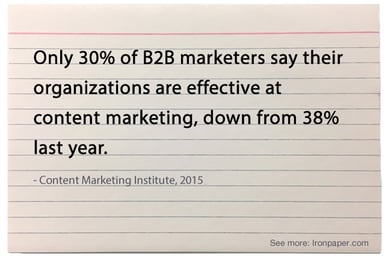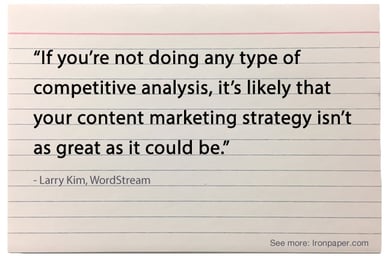 Content is used as a valuable marketing tool across all industries. From social media content to long-form evergreen content, marketers constantly write to build awareness and nurture relationships. While the goal of content marketing is clear, many companies forget to track what type of content is actually working.
Content is used as a valuable marketing tool across all industries. From social media content to long-form evergreen content, marketers constantly write to build awareness and nurture relationships. While the goal of content marketing is clear, many companies forget to track what type of content is actually working.
Even powerhouse Microsoft fell into that habit. At one point the Microsoft.com website had 10 million pages of content but 3 million of them had never been visited. By removing unnecessary and irrelevant content, Microsoft made its customers much happier and learned what type of content works in attracting consumers. And all of that happened by conducting a content audit.

5 Reasons for a Content Audit
There are a variety of reasons that a company might need a content audit. Here are some of the problems that plague companies because of the lack of a content audit.
Lots of Traffic Coming in But Not Many Qualified Leads
Here’s a scary stat: one-third of B2B marketers don’t track where their leads come from. This clearly needs to be corrected in order to figure out what marketing channels work and which should be eliminated. Once your company takes a look at lead generation, you may find that while more and more traffic comes in, none if it is really relevant to your brand.
This is oftentimes a content problem. The content could be attracting the wrong target and therefore no one converts. 56% of survey respondents said they were doing content marketing without a plan. When qualified leads are not coming in, maybe the content was not written with a clear buyer persona; therefore, the content does not address a specific need or pain point of that audience.
Unclear Value Proposition = Unclear Content
Only 7% of leadership teams can explain a clear, common value proposition, but 85% of CEOs say their employees can state the company’s value proposition. This dichotomy leads to very unclear content. If writers do not have a clear picture of the company’s value, then the content will reflect this and appear confusing to the reader. A value proposition helps build relevance for target buyer personas, helping to improve engagement, shares, conversions, and trust.
Blog Doesn’t Play a Role in Sales
B2B marketers that use blogs receive 67% more leads than those who do not. Many companies, however, do not use the blog as part of the sales process, which means no leads or opportunities come through because of the blog.
This can be because the sales and content marketing teams are not aligned. The blog should help push leads down the sales funnel, helping to produce qualified leads. A company’s blog can also help provide sales teams useful nurturing content as they help prospects navigate the awareness, consideration, and decision stages of the buying process.
Leads or Sales Goals Aren’t Met
If leads or sales metrics are falling behind, surprisingly this could be because the content strategy is not tied to the sales strategy. Before revising the sales process, performing a content audit could uncover why certain goals aren’t met. Content must aid the sales process, as 41% of businesses say curated content increased the number and/or quality of sales-ready leads.
Blog Subscribers Don’t Read Your Content
If people that actively subscribed to your blog content are not reading it, then a content audit is desperately needed. By finding out why these people subscribed, you can start to get your content back on track. Perhaps with different team members writing, blog content began to drift from its original purpose, making it no longer useful for the audience.
What To Do Next
Before launching into a full scale content audit, take a step back and ask some key questions about the content being created.

- Is the Content Value-Driven? Does the content align with the company’s value proposition? What are the key value points that relate to your customer and does the content reflect this?
- Is the Content Persona-Driven? Does your content align to the needs, interests, and opportunities associated with target buyer personas or an ideal buyer profile?
- Is the Content Results-Driven? Does your content assist in the conversion of leads and sales opportunities? Does the marketing team align efforts with results? Which content assists in conversions of leads and which content does not? Using Hubspot, identify which content directly influencers sales qualified leads.
- Have You Invested in a Content Strategy? Have time and resources been fully invested to craft the best content strategy? Has this content team continually updated and improve and build upon top-performing content?
- Are the Sales and Marketing Teams Aligned? Content can play a huge role in sales, so identify the weak points in the sales process and align marketing strategies along those points. Have you found opportunities to support, educate, inspire, and guide buyers through the sales funnel? Content can help with each step, so marketing and sales teams should meet on a consistent basis.

You Probably Need a Content Audit
If you answered no to any of these questions, then it is time for a content audit. A content audit can help improve sales, make your customers happier, and get rid of unnecessary pages that can be bogging down your website, so if you have fallen into any of the traps listed above, it’s time to audit the content on your website.
View more content marketing stats and trends.
from HubSpot Marketing Blog https://blog.hubspot.com/marketing/company-content-audit

No comments:
Post a Comment